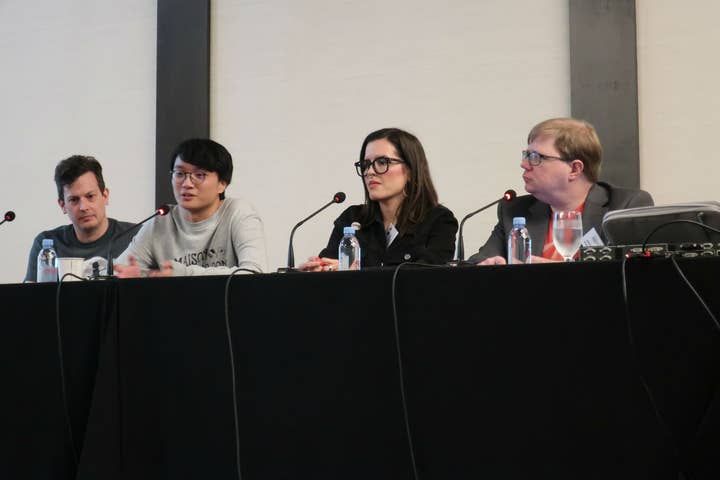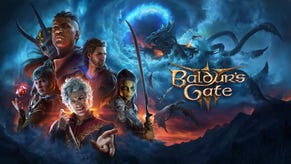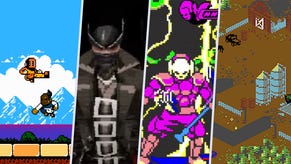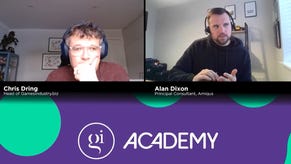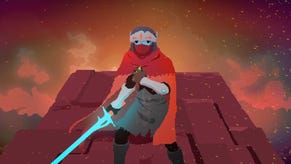The ins and outs of funding your next game
Publishers, a crowdfunding platform, and a development fund share insight and advice on the whats, whens, and hows of securing investment
At the GamesIndustry.biz Investment Summit at PAX Dev, numerous publishers, investors and platform holders heard pitches from developers hoping to secure funding, support, or publishing deals for their games. But beforehand, four stood onstage and explained exactly what they would be looking for then and in the future.
The four were head of technology at Gearbox Publishing Jimmy Sieben, Kickstarter's Anya Combs, Fellow Traveler founder Chris Wright, and Kowloon Nights' Keizac Lee, who opened a panel discussion with enthusiasm about the current gaming landscape, where funding is more plentiful than ever.
When asked what in the industry is currently exciting publishers and investors, the panel seemed to unanimously agree that the answer is just about everything. Sieben pointed out new platforms and business models, specifying the Epic Games store, VR, and Xbox Game Pass as interesting new ways to allow more games to be funded than ever. Lee agreed.
"I would go as far as saying we're in a golden age of interactive entertainment"
Keizac Lee
"I would go as far as saying we're in a golden age of interactive entertainment," he said. "Many developers have access to funding nowadays. And because Kowloon is a fund, subscription platforms are very interesting to us, because we're genre agnostic. If you are a subscriber to Game Pass, you get to play many different genres, try many different games that you otherwise might not be able to play. Because we don't have a specific type of game that we invest in, it's a little bit more appealing to platforms."
Wright added: "One of the things we get excited about as an investor is how many alternative sources of funding there are for our developers. It's always a mission for us to try and find our devs the cheapest funding, and our terms are very flexible. So for example, we've had a game which we funded up to a certain amount, we then got them a deal with a platform, which meant they only needed half that funding. And so because we have indie fund terms, they're only paying back the money that they've taken. It's exciting to us that devs have more options than ever before."
With so many different sources of funding available, it can be challenging for a developer to decide where to start. Because the panel had representatives of publishers, funds, and funding platforms all available, their answers varied, though a common theme persisted: get whatever funding you can.
"We see a lot of combinations of the types of funding," said Lee. "If you go with Kowloon, we're very neutral. You can go on to work with a publisher, or you can go on to raise Kickstarter money, you can go on to raise equity money. It's really a combination of trying to mix and match these different funding options to what suits your studio.
"Early on, you might seek prototype financing. If you're a little bit later on or if the game is going to blow up, you might seek equity funding. Or if you just need a bridge or something like that, something like a Kickstarter would come in handy. It's really just finding what you can get, and also having the right combination of funding at different stages of the company and also different stages of development."
"Making a commitment early -- it's great that you're funded, but maybe you did a really bad deal"
Chris Wright
Wright agreed with the idea of spreading out and trying multiple funding types, but encouraged developers not to be too hasty to accept a big deal. "We often have chats with developers that are pitching us for a large amount of money," he said. "And we're saying, 'You've got two years to go, and there are eight platforms you can pitch this to. You should not be committing to a deal whereby you're giving up a large percentage now and you've got all this time. What do you need for the next 12 months?'
"Making a commitment early -- it's great that you're funded, but maybe you did a really bad deal. And you could have got a much better deal if you waited, or taken some and then taken more later."
Combs added some Kickstarter-specific advice: "You want to wait until the absolute last possible minute, when you're saying you really, really need this funding -- you're in alpha, beta, whatever it is, you've exhausted all your resources. But we've had a number of people come to Kickstarter, launch their project, and then actually work out a publishing deal because of the success of their Kickstarter."
But do you even need that publishing deal? The panel agreed that while publishers are helpful and often necessary (especially given that some of them are publishers themselves), their ultimate goal is to get developers to become as self-sufficient as possible over the course of a single game or multiple releases.
"Right now on a portfolio of 20 games, we probably have 17 or so that are self-publishing," Lee said. "So we really want to give developers the chance to explore and to learn the skill of self-publishing, because we think it's very important when you're building the long-term goal of your studio. You want to not be dependent on a certain publisher, and you want to build up that studio brand.
"But on the other hand, we have developers that need to work with a publisher because the game is getting too big, or where they just don't want to deal with marketing, or where they just can't actually do so. And that's where we like to pair our studios up with publishers as well."
"A publisher is a choice, not a requirement. In today's industry, we're not gatekeepers"
Chris Wright
Sieben added: "We view some of the funds at Kowloon and other funding sources as very much complementary to publishing. If a game already has a lot of funding, maybe they only need a little bit of support from us just to get them to retail distribution channels, because we've seen that over half of new franchise game sales come from retail. We definitely see that being on the publishing side and working with any size team, there are opportunities to help, even if it's not taking on all of the responsibility."
Wright concluded: "As a publisher, obviously, we think what we do is valuable, but we're pretty honest. We're not always the best fit. A publisher is a choice, not a requirement. In today's industry, we're not gatekeepers. A key philosophy driving us is that the developers should come out of this as more able to self-publish rather than less. So we should be open with contracts and helping developers along the way, and if they want to come back to us for the next game, that's awesome. But we don't want them to feel like they never get to build up themselves."
As the four panellists were all preparing to hear pitches from developers, they went on to provide some advice for those bringing their pitches forward, either that day or in the future. The first big piece? Don't fret if you don't have a proven track record.
"We sign stuff all the time from people that don't have a proven track record," said Wright. "It comes down to the game. Okay, it's a slight worry if it's their first major game. But that matters way more to us than 'Hey, I've shipped five games and here's a game idea that's not actually that interesting.'"
Combs added: "You should essentially just always be making stuff. You should just always be making even small games. So if you have your own website that has a portfolio where you're like 'This game's halfway done, but it's something that I've worked on,' or like 'This game's a five-minute experience,' at least it shows that you've made something. And I think that's so much more important than necessarily being involved in really big projects."
"Nobody's going to read through like a PDF document and then say, yeah, I'll give you $20"
Anya Combs
If not having a track record isn't a deal-breaker, then what is? The answer differs from publisher to fund to publisher, so knowing the platform is essential. For example, a crowdfunding site like Kickstarter and a fund like Kowloon have very different expectations.
"Here's the deal," Combs said. "People come to me and they're like 'Oh, I just have a good game design document.' I'm like 'Well, how is that going to be translated into a culture where we have eight seconds to grab someone's attention?' The easiest way to do that is through video. Nobody's going to read through like a PDF document and then say, yeah, I'll give you $20."
But for Lee and Kowloon Nights, that doesn't matter: "We actually sign games at the paper-pitch level. But having said that, one of the big turn-offs is when developers come to me and they show me the game and they ask 'What does it take to get funded?' That kind of work-for-hire mentality. We invest in creators that are very self-sufficient, very creatively tuned in, so we're not really conditioning the production of the game. I don't want to see that. I think that's where developers get it wrong sometimes."
The publishers also weighed in, saying that for them, a hazy or uncertain vision of a game is what puts them off a potential title.
"At Gearbox, a strength is when a team is coming with a really crisp vision of what their game is, and also what it isn't," said Sieben. "There are a lot of trends out there in gameplay that come and go. If you're a developer building a pitch it can be tempting to try to appeal to as many publishers or funding sources as possible by throwing in all these ideas and trying to hit these bullet points. And from the publisher side, we look at a pitch like that and think, 'Oh, look, this team doesn't know what games are making.' So it's really important to have a point of view and be able to talk about it passionately."
Wright added: "We've had some devs improvise and say 'Okay, here's the game, but we can change this and we can change that. What do you think it should be?' It's like, this is your game, guys. That's not our job and that just says immediately that you don't believe in this game. Sure, we're giving you feedback, but you're supposed to be the designers. Don't change it to make it fit with us. Let's figure out if it is a fit."
That's what not to do. The panel concluded with each of the four speakers offering a single piece of advice on what to do for developers preparing to pitch not just that day, but any time.
For Sieben and Gearbox: "Have a really crisp vision, be really excited in how you present it and be open to a conversation about what that vision is, I think that's the most important thing for us."
Lee suggests: "[Pitch your] game first, before [you talk about the] team and all the background story."
Combs' advice for Kickstarter: "Be honest and ask any questions that you want. Even if you think it's a dumb question, there's no such thing as a dumb question, it just means you don't know the answer and that's okay. And ask questions that you might know the answer to, but sometimes you just need to hear the response from whoever you're talking to."
Wright concludes by agreeing with Combs: "I had 15 or 20 game meetings during Gamescom and very few of them actually asked me questions. It's way more impressive when someone's asking 'Okay, so how's this going to work? What do you do and why? Why are you interested? Why are you taking this meeting?' If you're in front of us, you're sitting there because of a reason. Just asking why they're interested can tell you a lot."
